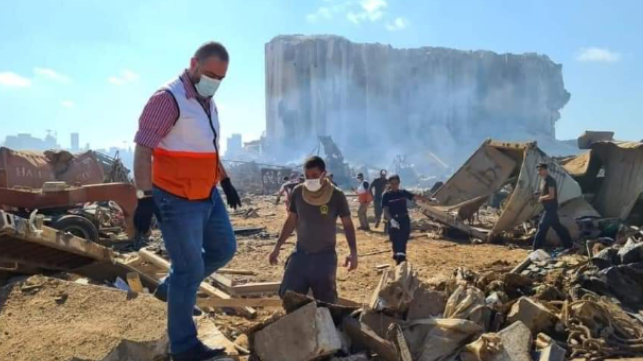Report: Most of Explosive Cargo Went Missing Before Beirut Blast

Just ahead of the first anniversary of the Port of Beirut blast, a leaked FBI report estimates that only one-fifth of the cargo involved in the blast actually exploded - indicating that unauthorized removal of the other four-fifths may have saved the city from a far larger disaster.
2,750 tonnes of the explosive substance arrived at the port aboard the vessel Rhosus in 2013, but the FBI's investigators estimated that just 550 tonnes of ammonium nitrate exploded. The remaining 2,200 tonnes are unaccounted for, and it may have been stolen or diverted. Some Lebanese officials told Reuters that the rest could have been in the warehouse and blown out to sea by the force of the blast, but the FBI's assessment concluded that "it is not logical that all of [the one-tonne cargo bags] were present at the time of the explosion."
According to Reuters, some officials have quietly suggested that they think that the cargo was stolen. The warehouse containing the ammonium nitrate lacked basic security features: its door was broken, and there was a large hole in one of its walls. Workers who were attempting to repair these deficiencies are believed to have sparked the explosion by carrying out hot work near the cargo.
Ongoing human toll
One year on, the blast's impact on the Lebanese economy is still severe. According to aid charity Save the Children, about half of Lebanese citizens lack the resources to afford basic goods. Rampant inflation has driven up prices, leaving the official exchange rate between the Lebanese pound and the dollar in the dust. This taken the currency down by 80 to 90 percent of its worth, leaving even those with well-paid jobs with difficulty obtaining food and necessities.
"Hundreds of thousands of children are going to bed hungry, often without having eaten a single meal that day," said Save the Children country director Jennifer Moorehead in a statement. "Families can’t afford the electricity to run a fridge or hot water, or the medicines they need to treat illness. The longer this situation continues, the more likely it is that children will slide into malnutrition, which ultimately could lead to death."
International donors pledged a total of $250 million in aid to Lebanon after the blast, and the World Bank provided an emergency loan of another $250 million. However, outside policy experts say that the Lebanese government and its banking system have prioritized assistance to politically-connected, well-to-do citizens. A protest movement after the blast succeeded in forcing the resignation of Lebanese Prime Minister Hassan Diab and his cabinet; Diab resumed his role as "caretaker prime minister" and remains in office today.

that matters most
Get the latest maritime news delivered to your inbox daily.
The investigation into the cause of the blast has slowed, and investigating judge Tarek Bitar's efforts to question high-level officials and politicians have run into resistance from the political establishment. The previous judge on the case, Fadi Sawan, faced accusations of political bias for attempting to question high-ranking officials, and he was ultimately removed from the case by two of the politicians he was investigating.
Documents unearthed by AP suggest that leaders at the highest level of the Lebanese government were informed of the presence of the ammonium nitrate cargo prior to the explosion. Last August, President Michel Aoun confirmed that he had prior knowledge and asserted that he ordered the military and security agencies to address the issue. On Friday, for the first time, he informed Lebanon's public prosecutor that he would be willing to give a statement to investigators about the circumstances behind the explosion.
